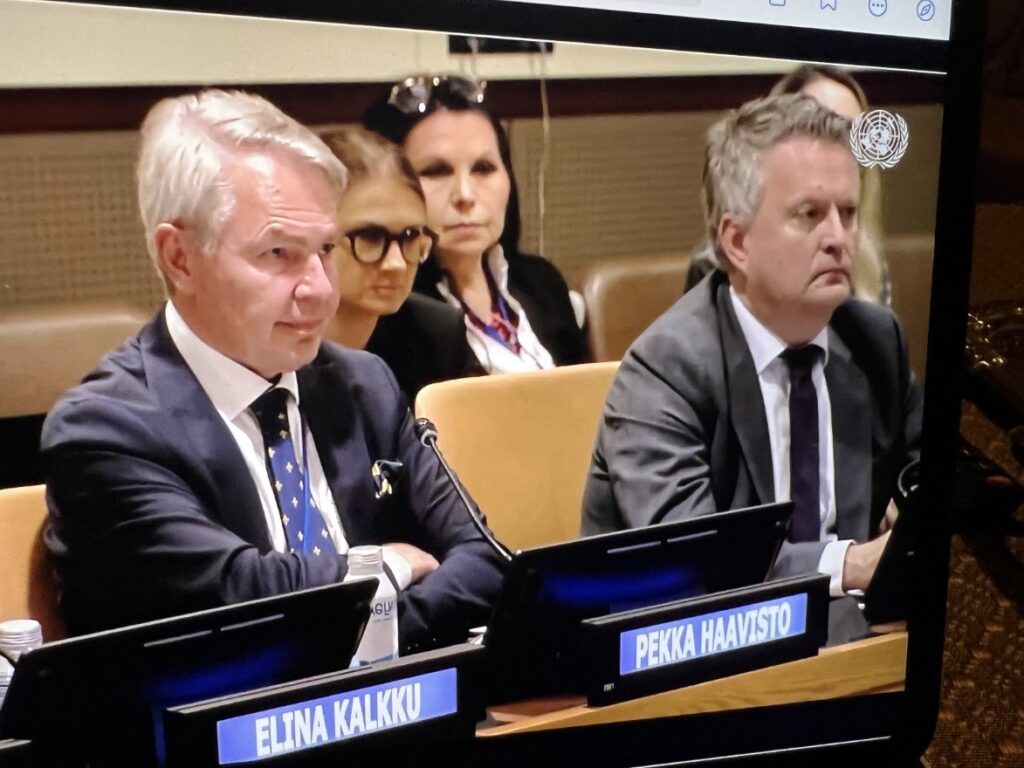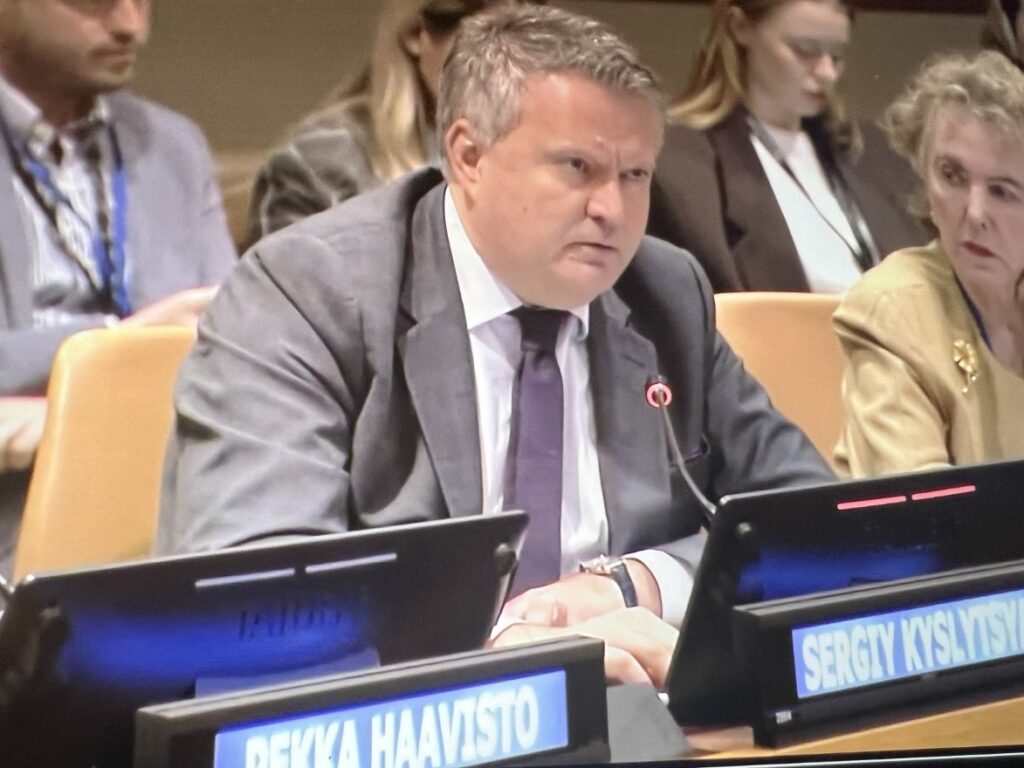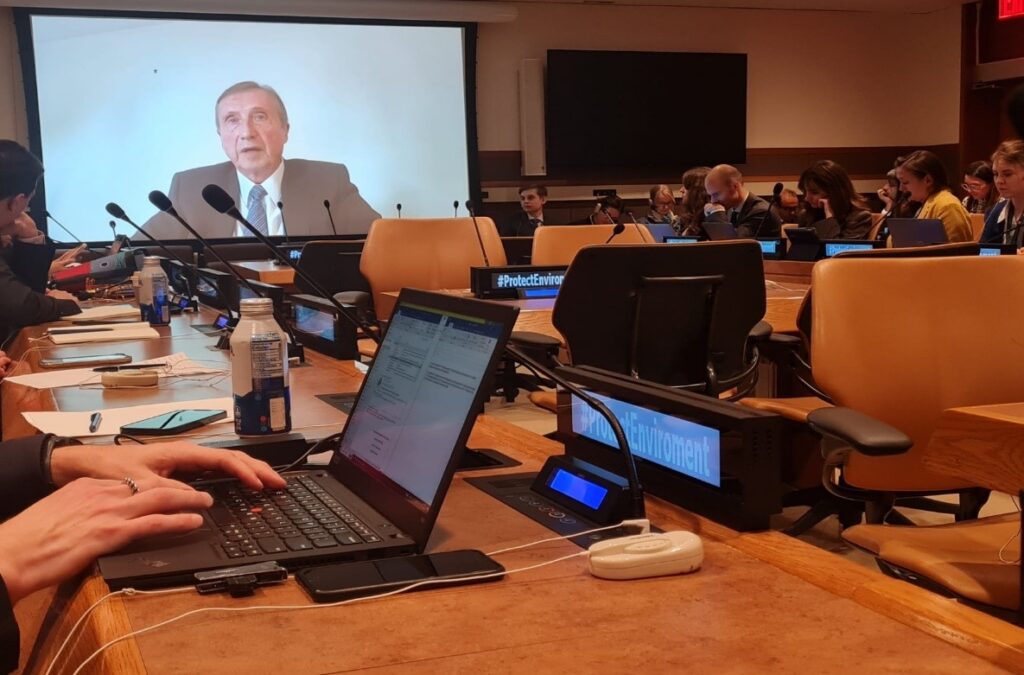On November 6, 2024, the UN Headquarters hosted the seminar “Environmental Security in War and Armed Conflict.” Special attention was given to the environmental consequences of the war in Ukraine. The event was dedicated to the International Day for Preventing the Exploitation of the Environment in War and Armed Conflict and brought together government and public figures from over 20 countries worldwide. The main objectives of the seminar included: assessing the scale of environmental damage inflicted on Ukraine; raising awareness within the international community about the regional and global consequences of the Russia-Ukraine war; drawing attention to the need for legal evaluation of environmental damage, the organization of measures for its compensation, and holding those responsible accountable; presenting Ukraine’s efforts to restore the environment with the support of international partners; and fostering global cooperation to protect the environment during armed conflicts.

The event was moderated by Mr. Pekka Haavisto, a member of parliament and former Minister for Foreign Affairs of Finland. In his opening remarks, he emphasized that environmental security is one of the key challenges for the international community, citing examples of the devastating impacts of war on nature in Syria, Afghanistan, Liberia, Sudan, and other regions of the world. He stressed the importance of uniting efforts to implement Point 8 of Ukraine’s peace formula. Environmental violations during war contradict international law and require international support. The global community must assist Ukraine in assessing the damage, developing response measures, legally evaluating and documenting instances of environmental crimes for future compensation and accountability, as well as restoring the environment through reclamation, demining, reforestation, creation of protected areas, and water purification. Environmental security demands coordinated efforts from states, international organizations, and society for sustainable recovery and the protection of nature, ensuring peace and prosperity for future generations.
Permanent Representative of Ukraine to the UN Mr. Sergiy Kyslytsya and Permanent Representative of Finland to the UN Ms. Elina Kalkku, in their opening speeches, highlighted the global environmental consequences of the war in Ukraine.

Sergiy Kyslytsya expressed gratitude to the seminar organizers, representatives of Finland, Germany, Bulgaria, Ukraine, the Ministry of Environmental Protection and Natural Resources of Ukraine, and international organizations, emphasizing that Russia’s aggression has caused irreparable damage to Ukraine’s environment. The seizure of the Zaporizhzhia Nuclear Power Plant, constant attacks on energy and industrial infrastructure, dam demolitions, and water and soil pollution have led to catastrophic consequences for nature and people. In 2024 alone, over 24,000 hectares of forest were destroyed by fires, releasing 180 million tons of CO2 into the atmosphere – equivalent to the annual emissions of over 90 million cars, posing a threat to other countries due to the transboundary nature of these threats. He called on the international community to actively support Ukraine in environmental recovery by providing assistance and conducting legal assessments of the damage.
Elina Kalkku emphasized that on the International Day for Preventing the Exploitation of the Environment in War, representatives from various countries gathered at the UN to support Ukraine, which is fighting for its sovereignty, while other countries also suffer from war-related destruction, including Sudan, the Palestinian territories, and others. She reminded that lasting peace cannot be built on foreign domination or dictation. Today’s event followed a high-level working group meeting attended by the Prime Minister of Ukraine.
During the seminar, video materials prepared by the Ministry of Environmental Protection and Natural Resources of Ukraine were shown, illustrating the environmental losses caused by the war. A panel discussion chaired by Pekka Haavisto brought together representatives from different countries, international organizations, and experts.
The Minister of Environmental Protection and Natural Resources of Ukraine, Svitlana Hrynchuk, stressed that today, Europe’s environmental security is inseparable from its military security. Ukraine’s experience and the registration of environmental damage confirm this. As a result of military actions, the natural environment of the country has suffered damage exceeding $71 billion. More than 10,000 missiles have been launched at infrastructure, including energy facilities and residential buildings. In October 2024 alone, Russians launched 2,000 drones at these facilities. There is substantial evidence of environmental destruction in occupied territories, ranging from illegal land use to the removal of animals from the Askania-Nova reserve. The minister also presented Ukraine’s efforts to implement European environmental protection standards as part of its EU integration and emphasized that Ukraine, acting in line with the eighth point of its peace formula, is doing everything possible to mitigate the environmental consequences of the war, including land clearing, forest restoration, and the creation of protected areas.
The Minister of Climate and Environment of Finland, Mr. Kai Mykkänen, highlighted that Ukraine is defending its right to exist as a sovereign nation and, at the same time, fighting against colonialism on behalf of the entire democratic world. “It is an honor for me to report on the international conference on environmental security held in Helsinki on October 19, 2024. It was a pleasure to share this conference with my colleague, Ukrainian Minister Svitlana Hrynchuk. During the conference, we identified four key aspects of this issue: assessing the damage and destruction of Ukraine’s natural environment, ensuring accountability for inflicted damage, restoring the environment damaged by the war, and enhancing resilience to climate change and future environmental disasters. Based on President Zelensky’s peace formula, we support the work of the international group on these issues, which completed the first phase of its work in February 2024. The group is now continuing to assist the Ukrainian government in implementing environmental recommendations.”
The Director of the UN Environment Programme (UNEP), Dr. Jamil Ahmad, spoke about the UN’s role in monitoring the environmental impacts of the war and emphasized the importance of assessing this damage for planning recovery actions. Recently, UNEP conducted six studies on the impact of military conflicts on the environment in various countries, including Ukraine. A study and report were completed on the consequences of the destruction of the Kakhovka Hydroelectric Power Plant dam. At the Ukraine Recovery Conference in Berlin (June 11–12, 2024), in collaboration with Germany’s Ministry of Environment, the OECD, and the UN Economic Commission for Europe, a platform for green recovery actions for Ukraine was presented. Notably, Ukraine recently ratified the BRS Conventions (Basel, Rotterdam, and Stockholm Conventions) and is working on ratifying the Convention on Biological Diversity (CBD). Both of these conventions are essential international agreements.
Dr. Christine K. Durbak, Chair and Founder of the international organization World Information Transfer, emphasized that the war in Ukraine has been ongoing for nearly 11 years. During this time, long-term and irreparable damage has been inflicted on the environment and society. This includes the destruction of forests, the demolition of hydroelectric dam facilities, the devastation of large enterprises, threats to nuclear energy, and much more. The environmental crimes committed by Russia in Ukraine are not isolated incidents – they have been enabled by the disregard for international law and institutions. Russia has violated virtually all acts of international environmental security law, including UN Convention No. 92 on chemical weapons, the 1976 UN Convention prohibiting the use of environmental modification techniques for military purposes, key articles of the 1977 First Additional Protocol to the Geneva Convention, and many others. The consequences of these actions constitute crimes against humanity under Article 7 of the International Criminal Court concerning environmental destruction. Only a change in the attitude of the international community and the unification of efforts to aid Ukraine can stop this destructive process.
Vivian Okkake, Director of the New York office of the International Atomic Energy Agency (IAEA), highlighted the risks associated with nuclear energy in conflict zones, particularly outlining the situation at the Zaporizhzhia Nuclear Power Plant and stressing the importance of international monitoring to prevent potential nuclear disasters. She noted that IAEA Director General Rafael Mariano Grossi proposed an aid program to Ukrainian President Volodymyr Zelensky, similar to those provided to countries after natural disasters and accidents. Such assistance was previously given to Peru in 2022 for cleaning significant areas after an oil spill, as well as to Turkey and Syria in 2023 following a 7.8 magnitude earthquake. The initial phase of aid to Ukraine amounted to €2.7 million, but in September 2024, its volume was increased by an additional 65%. New directions for supporting Ukraine are currently being explored to prevent nuclear catastrophes caused by military actions.

The Chairman of the Ukrainian Peace Council, Mykhailo Zgurovsky, on behalf of Ukrainian non-governmental organizations — the Ukrainian Peace Council and the Council for Environmental Safety — addressed the global community, urging attention to the scale of environmental destruction in Ukraine, whose consequences extend far beyond the country’s borders and pose serious environmental, food, and nuclear threats to the entire world. He emphasized that since the start of the war in 2014, and especially after the full-scale invasion in 2022, more than 300,000 hectares of Ukrainian land have been environmentally contaminated. One of the most serious threats has been the mining of over 170,000 square kilometers of Ukrainian territory, which constitutes about 28% of the country’s total area. This mining has not only rendered vast areas of arable land unusable but has also exacerbated the global food crisis, particularly in countries dependent on Ukrainian grain exports. The destruction of over 500,000 hectares of forests and protected areas has led to significant biodiversity loss and increased greenhouse gas emissions, negatively impacting global climate stability. The destruction of the Kakhovka Hydroelectric Power Plant in 2023 caused the flooding of over 100,000 hectares of land, leaving about one million people without access to drinking water. This has created a risk of transboundary water and air pollution, already affecting Poland and Hungary. The occupation of the Zaporizhzhia Nuclear Power Plant, shelling, and power supply disruptions pose an unprecedented risk of nuclear catastrophe, whose consequences would have devastating effects on the health, economy, and environment of the entire continent. Mykhailo Zgurovsky stressed that the war is inflicting irreparable harm on the health of Ukrainians, which is why the Ukrainian Peace Council has launched the “Peace and Healthy Ukraine” program, focusing on providing psychological support to wounded soldiers, veterans, and displaced persons. Thanks to the successful Ukrainian startup “Rozmova” platform, more than 750 professional psychologists are already providing support to those affected. Mykhailo Zgurovsky called on the international community for decisive and united action to end this war, which not only destroys nations but also threatens the ecological stability of the planet.
Advocacy Advisor for the non-governmental organization PAX (Netherlands), Ms. Brittany Roser (PAX, a Latin word meaning “PEACE”), delivered an in-depth analysis of the nature and scale of the environmental destruction in Ukraine. She emphasized the necessity of documenting the damage to understand specific environmental risks, ensure timely response and mitigation measures, and enhance emergency preparedness. Documentation is also crucial for integrating environmental considerations into post-conflict assessment, reconstruction systems, and green recovery planning, as well as for collecting evidence to establish accountability for environmental damage (damage registry and proceedings at the International Criminal Court) and raising awareness in international policy regarding the environmental aspects of armed conflicts and ecocide.
During the closing discussion, representatives from various UN member states, including Bulgaria, the Netherlands, Lithuania, France, Latvia, and the EU, made statements. They expressed their support for Ukraine in overcoming the environmental consequences of the war and stressed the need for holding those responsible for environmental harm during conflicts accountable. The speakers called for coordinated international actions to prevent similar tragedies in the future.
In conclusion, Chairperson Mr. Pekka Haavisto summarized the seminar. He emphasized the unanimous support of the international community for Point 8 of Ukraine’s peace formula, aimed at addressing the environmental consequences of the war. The chair proposed supporting the work of the Ministry of Environmental Protection and Natural Resources of Ukraine as the coordinator of joint efforts to protect the environment during the war. He underscored the importance of organizing coordinated measures directed at the restoration and protection of Ukraine’s environment, as well as holding those responsible for the damage accountable. It was noted that only global cooperation and increased environmental awareness can help prevent ecological tragedies and ensure a stable and secure existence for future generations.
Olesia Diatchuk
